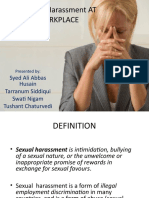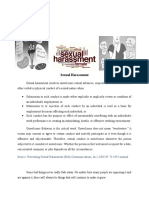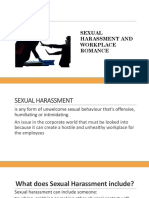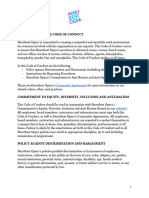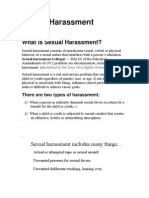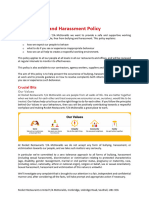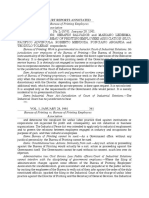Sexual Harrassment
Sexual Harrassment
Uploaded by
Roneil Quban WalkerCopyright:
Available Formats
Sexual Harrassment
Sexual Harrassment
Uploaded by
Roneil Quban WalkerOriginal Description:
Copyright
Available Formats
Share this document
Did you find this document useful?
Is this content inappropriate?
Copyright:
Available Formats
Sexual Harrassment
Sexual Harrassment
Uploaded by
Roneil Quban WalkerCopyright:
Available Formats
What is Sexual Harassment
{PRIVATE}What? The EEOC has defined sexual harassment in its guidelines as: Unwelcome sexual advances, requests for sexual favors, and other verbal or physical conduct of a sexual nature when: Submission to such conduct is made either explicitly or implicitly a term or condition of an individual's employment, or Submission to or rejection of such conduct by an individual is used as a basis for employment decisions affecting such individual, or Such conduct has the purpose or effect of unreasonably interfering with an individual's work performance or creating an intimidating, hostile, or offensive working environment.
Unwelcome Behavior is the critical word. Unwelcome does not mean "involuntary." A victim may consent or agree to certain conduct and actively participate in it even though it is offensive and objectionable. Therefore, sexual conduct is unwelcome whenever the person subjected to it considers it unwelcome. Whether the person in fact welcomed a request for a date, sex-oriented comment, or joke depends on all the circumstances. Source: Preventing Sexual Harassment (BNA Communications, Inc.) SDC IP .73 1992 manual Sexual harassment includes many things... Actual or attempted rape or sexual assault. Unwanted pressure for sexual favors. Unwanted deliberate touching, leaning over, cornering, or pinching. Unwanted sexual looks or gestures. Unwanted letters, telephone calls, or materials of a sexual nature.
- { PAGE } -
Unwanted pressure for dates. Unwanted sexual teasing, jokes, remarks, or questions. Referring to an adult as a girl, hunk, doll, babe, or honey. Whistling at someone. Cat calls. Sexual comments. Turning work discussions to sexual topics. Sexual innuendos or stories. Asking about sexual fantasies, preferences, or history. Personal questions about social or sexual life. Sexual comments about a person's clothing, anatomy, or looks. Kissing sounds, howling, and smacking lips. Telling lies or spreading rumors about a person's personal sex life. Neck massage. Touching an employee's clothing, hair, or body. Giving personal gifts. Hanging around a person. Hugging, kissing, patting, or stroking. Touching or rubbing oneself sexually around another person. Standing close or brushing up against a person. Looking a person up and down (elevator eyes). Staring at someone. Sexually suggestive signals. Facial expressions, winking, throwing kisses, or licking lips. Making sexual gestures with hands or through body movements.
- { PAGE } -
{PRIVATE}Examples VERBAL Referring to an adult as a girl, hunk, doll, babe, or honey Whistling at someone, cat calls Making sexual comments about a person's body Making sexual comments or innuendos Turning work discussions to sexual topics Telling sexual jokes or stories Asking about sexual fantasies, preferences, or history Asking personal questions about social or sexual life Making kissing sounds, howling, and smacking lips Making sexual comments about a person's clothing, anatomy, or looks Repeatedly asking out a person who is not interested Telling lies or spreading rumors about a person's personal sex life
NON-VERBAL Looking a person up and down (Elevator eyes) Staring at someone Blocking a person's path Following the person Giving personal gifts Displaying sexually suggestive visuals Making sexual gestures with hands or through body movements Making facial expressions such as winking, throwing kisses, or licking lips
PHYSICAL Giving a massage around the neck or shoulders
- { PAGE } -
Touching the person's clothing, hair, or body Hugging, kissing, patting, or stroking Touching or rubbing oneself sexually around another person Standing close or brushing up against another person
{PRIVATE}Terminology SEXISM is an attitude. It is an attitude of a person of one sex that he or she is superior to a person of the other sex. For example, a man thinks that women are too emotional. Or a woman thinks that men are chauvinists. SEX DISCRIMINATION is a behavior. It occurs when employment decisions are based on an employees sex or when an employee is treated differently because of his or her sex. For example, a female supervisor always asks the male employees, in a coed workplace, to move the boxes of computer paper. Or, a male supervisor always asks the female employees, in a coed workplace to plan office parties. SEXUAL HARASSMENT is a behavior. It is defined as unwelcome behavior of a sexual nature. For example, a man whistles at a woman when she walks by. Or a woman looks a man up and down when he walks towards her. SUBTLE SEXUAL HARASSMENT is a behavior but not a legal term. It is unwelcome behavior of a sexual nature that if allowed to continue could create a QUID PRO QUO and/or a Hostile Work Environment for the recipient. For example, unwelcome sexual comments, jokes, innuendoes. QUID PRO QUO HARASSMENT is when employment and/or employment decisions for an employee are based on that employees's acceptance or rejection of unwelcome sexual behavior. For example, a supervisor fires an employee because that employee will not go out with him or her. HOSTILE WORK ENVIRONMENT is a work environment created by unwelcome sexual behavior or behavior directed at an employee because of that employee's sex that is offensive, hostile and/or intimidating and that adversely affects that employee's ability to do his or her job. For example, pervasive unwelcome sexual comments or jokes that continue even though the recipient has indicated that those behaviors are unwelcome.
You might also like
- Flyers Sexaul HarassmentDocument2 pagesFlyers Sexaul HarassmentVanezaKateYeclaRetinioNo ratings yet
- Sexual Harassment Prevention PowerPoint For Volunteers 2017Document27 pagesSexual Harassment Prevention PowerPoint For Volunteers 2017amar.ragaaiNo ratings yet
- Sexual Harassment JyotiDocument17 pagesSexual Harassment Jyotideep shikha gusainNo ratings yet
- Sexual Harassment PreventionDocument15 pagesSexual Harassment PreventionNikita KarambelkarNo ratings yet
- Describe Three Negative Issues That You May Face at A Future JobDocument41 pagesDescribe Three Negative Issues That You May Face at A Future JobZeba Saghir100% (1)
- Anti Sexual HarassmentDocument58 pagesAnti Sexual HarassmentjaypeNo ratings yet
- Anti Sexual HarassmentDocument58 pagesAnti Sexual HarassmentsasantiNo ratings yet
- Sexual HarrassmentDocument48 pagesSexual Harrassmentsashwata banerjeeNo ratings yet
- Sunila SexualHarassmentOrientationDocument17 pagesSunila SexualHarassmentOrientationasifanisNo ratings yet
- Sexual Harassment: in The WorkplaceDocument27 pagesSexual Harassment: in The WorkplaceThox SicNo ratings yet
- Sexual Harassment at Workplace MANUALDocument15 pagesSexual Harassment at Workplace MANUALBhushan Lokmitra100% (1)
- Sexual Harassment and ParaphilliasDocument27 pagesSexual Harassment and ParaphilliasMark Porcadilla100% (2)
- Sexual Harassment Awareness TrainingDocument39 pagesSexual Harassment Awareness TrainingBayou100% (1)
- Sexual Harassment BrochureDocument2 pagesSexual Harassment BrochurekingNo ratings yet
- Harassment - Types - Prevention of Harassment, ViolenceDocument33 pagesHarassment - Types - Prevention of Harassment, ViolenceFarheen NawaziNo ratings yet
- Sexual Harassment and ParaphiliasDocument4 pagesSexual Harassment and ParaphiliasGwen Mark CrespoNo ratings yet
- Sexual Harassment: Rica Jane Mendoza, CamilleDocument27 pagesSexual Harassment: Rica Jane Mendoza, CamilleFLORDELIZA A. MENDOZANo ratings yet
- Business Ethics: Ethical Issues in HRMDocument13 pagesBusiness Ethics: Ethical Issues in HRMpriyankakubdeNo ratings yet
- Acoso SexualDocument5 pagesAcoso SexualMalcolm PazNo ratings yet
- Denver City Council Respectful Workplace PolicyDocument10 pagesDenver City Council Respectful Workplace PolicyMichael_Lee_RobertsNo ratings yet
- Sexual Harassment: A Powerpoint TemplateDocument24 pagesSexual Harassment: A Powerpoint TemplateLumina ElyseNo ratings yet
- Gender and Society Group-5Document3 pagesGender and Society Group-5Marivic MiradorNo ratings yet
- Anti Sexual Harassment PolicyDocument14 pagesAnti Sexual Harassment PolicyShrish TiwariNo ratings yet
- Sexual Harassment Final 1214358212739667 8 - ADGDocument34 pagesSexual Harassment Final 1214358212739667 8 - ADGagripina gomezNo ratings yet
- Anti Sexual HarrassmentDocument26 pagesAnti Sexual HarrassmentZcharinaLykaFabellonSapunganNo ratings yet
- Unit 3 - Gender - Sexual HarassmentDocument29 pagesUnit 3 - Gender - Sexual Harassment.....No ratings yet
- Gad ReviewerDocument3 pagesGad Reviewerandreajade.cawaya10No ratings yet
- MoralDocument7 pagesMoralVeshal Purshothama SeelanNo ratings yet
- Nalin Arora 1Document80 pagesNalin Arora 1Manjeet SinghNo ratings yet
- Sexual HarassmentDocument3 pagesSexual HarassmentDr nadia Dr nadiaNo ratings yet
- Fighting For Women's Equality: Get Legal Help DonateDocument5 pagesFighting For Women's Equality: Get Legal Help DonateCRNo ratings yet
- Sexual Haressment - Group No 8Document24 pagesSexual Haressment - Group No 8asifanisNo ratings yet
- Ethical ChallengesDocument10 pagesEthical ChallengesEmmanuel DavowaNo ratings yet
- Anti-Bullying and Harassment Policy - SnakDocument11 pagesAnti-Bullying and Harassment Policy - Snakapi-668555739No ratings yet
- POSH-PPT2with Feed Back For Other OrganisationDocument37 pagesPOSH-PPT2with Feed Back For Other OrganisationJaydip GupteNo ratings yet
- Sexual Harassment Awareness Training FY 2014-2015Document9 pagesSexual Harassment Awareness Training FY 2014-2015api-213329838No ratings yet
- Preventing Harassment Creating A Positive Workplace Industrial VersionDocument8 pagesPreventing Harassment Creating A Positive Workplace Industrial VersionDhawal ModiNo ratings yet
- Sexual Harassment As A Form of Sexual OffenceDocument21 pagesSexual Harassment As A Form of Sexual OffenceShrota BaralNo ratings yet
- Sexual Harassment: Source: Preventing Sexual Harassment (BNA Communications, Inc.) SDC IP .73 1992 ManualDocument2 pagesSexual Harassment: Source: Preventing Sexual Harassment (BNA Communications, Inc.) SDC IP .73 1992 ManualMelissa LouiseNo ratings yet
- LESSON 2 and 3-GRADE 9-4TH QUARTERDocument17 pagesLESSON 2 and 3-GRADE 9-4TH QUARTERRizalyn Boladas Singh CudhailNo ratings yet
- Sexual Harrasment RA7877Document20 pagesSexual Harrasment RA7877jemrylNo ratings yet
- CCI Unit 1 - NotesDocument6 pagesCCI Unit 1 - NotesGeetha PriyaNo ratings yet
- Anti Harassment Policy in WorkplaceDocument23 pagesAnti Harassment Policy in WorkplaceShimanta RoyNo ratings yet
- HumphreyDocument8 pagesHumphreyHumphreyNo ratings yet
- Lesson 3 - Sexual Harassment and WorkplaceDocument17 pagesLesson 3 - Sexual Harassment and WorkplaceLaura AndreaNo ratings yet
- Sexual HarassmentDocument59 pagesSexual HarassmentJasmin ErmitaNo ratings yet
- Code of Conduct - Updated Sept 2023Document10 pagesCode of Conduct - Updated Sept 2023Vaibu MohanNo ratings yet
- EEO, Discrimination, Harassment, Bullying PolicyDocument10 pagesEEO, Discrimination, Harassment, Bullying PolicyK ShahNo ratings yet
- Sexual HarassmentDocument12 pagesSexual Harassmentredarmy101100% (2)
- POSH Training For HRDocument18 pagesPOSH Training For HRPallavi Nayak100% (1)
- Anti-Bullying Harassment PolicyDocument14 pagesAnti-Bullying Harassment Policyapi-749778361No ratings yet
- Workplace Ethics:: THE Workplace and Society, Sexual Harassment and DiscriminationDocument12 pagesWorkplace Ethics:: THE Workplace and Society, Sexual Harassment and DiscriminationEid TevesNo ratings yet
- Human Resources ManagementDocument14 pagesHuman Resources ManagementSameer AliNo ratings yet
- POSH - TraininngDocument25 pagesPOSH - TraininngRajesh Kumar100% (3)
- Examples of Sexual HarassmentDocument3 pagesExamples of Sexual HarassmentSameer AliNo ratings yet
- Harassment and Discrimination Policy - 10.26.17Document3 pagesHarassment and Discrimination Policy - 10.26.17melodyeherrera666No ratings yet
- Bullying - How To Cope With Bullying At SchoolFrom EverandBullying - How To Cope With Bullying At SchoolRating: 3 out of 5 stars3/5 (2)
- Because You Keep Asking: Questions about SEXuality from America's College StudentsFrom EverandBecause You Keep Asking: Questions about SEXuality from America's College StudentsNo ratings yet
- The Rich Port:: Puerto RicoDocument21 pagesThe Rich Port:: Puerto RicoRoneil Quban WalkerNo ratings yet
- Indigenous Societies Multiple ChoiceDocument11 pagesIndigenous Societies Multiple ChoiceRoneil Quban WalkerNo ratings yet
- NEW Marsh Sociology - Ch3Document42 pagesNEW Marsh Sociology - Ch3Roneil Quban WalkerNo ratings yet
- Sociology Matters Sample CH1Document35 pagesSociology Matters Sample CH1Roneil Quban WalkerNo ratings yet
- Findlay V FindlayDocument39 pagesFindlay V FindlayRoneil Quban WalkerNo ratings yet
- Unit 5: Legislation: Learning Objectives Defining LegislationDocument7 pagesUnit 5: Legislation: Learning Objectives Defining LegislationRoneil Quban WalkerNo ratings yet
- Staar 02 Industrialization and The Gilded AgeDocument44 pagesStaar 02 Industrialization and The Gilded AgeALEN AUGUSTINENo ratings yet
- Company Policies British English IntermediateDocument1 pageCompany Policies British English IntermediateAdelso GeorgeNo ratings yet
- Full download Business Essentials Canadian 7th Edition Ebert Test Bank pdf docxDocument58 pagesFull download Business Essentials Canadian 7th Edition Ebert Test Bank pdf docxasogwapocnea100% (4)
- Cover Letters Strive To ThriveDocument7 pagesCover Letters Strive To ThriveMayank AryaNo ratings yet
- Amla To Ra 10586Document34 pagesAmla To Ra 10586Parubrub-Yere TinaNo ratings yet
- Practice Exam 2014 Questions and Answers TestbankDocument255 pagesPractice Exam 2014 Questions and Answers TestbankAmr ElkholyNo ratings yet
- Chapter 2 - TEMMYPLATO EditedDocument15 pagesChapter 2 - TEMMYPLATO EditedTee BoyNo ratings yet
- Job Analysis QuestionnaireDocument19 pagesJob Analysis Questionnairessayem5142No ratings yet
- Answer-: Answer - Three Examples of Processes Leaders Can Use To Communication Information Associated WithDocument22 pagesAnswer-: Answer - Three Examples of Processes Leaders Can Use To Communication Information Associated WithDuminda KottahachchiNo ratings yet
- Strategy Implementation Staffing and DirectingDocument45 pagesStrategy Implementation Staffing and Directing언니은리No ratings yet
- CS T3Document29 pagesCS T3cooldudee08No ratings yet
- Understanding ANSI Z359 PDFDocument19 pagesUnderstanding ANSI Z359 PDFJaime Eduardo Cadena100% (1)
- Koopman v. Forest County Potawatomi Member Benefit Plan Et Al - Document No. 28Document10 pagesKoopman v. Forest County Potawatomi Member Benefit Plan Et Al - Document No. 28Justia.comNo ratings yet
- Personal Protective EquipmentDocument28 pagesPersonal Protective EquipmentShintonial OzileNo ratings yet
- Resolve Cross Cultural MisunderstandingDocument4 pagesResolve Cross Cultural MisunderstandingSweetMainaNo ratings yet
- Solution For The Problems in High Performance & PMS: NestleDocument31 pagesSolution For The Problems in High Performance & PMS: NestleAdrianus PramudhitaNo ratings yet
- Business English ModuleDocument32 pagesBusiness English ModuleZam ZamiNo ratings yet
- LET0317ra SOCIAL Tacloban PDFDocument39 pagesLET0317ra SOCIAL Tacloban PDFPhilBoardResults100% (1)
- SAEL HR - Employee Handbook - 4774341Document34 pagesSAEL HR - Employee Handbook - 4774341a.katochNo ratings yet
- MISDocument15 pagesMISTaha YaseenNo ratings yet
- Organization and Management11 - Q2 - Mod10 - Training and Development Compensation Wages and Performance Appraisal - v5Document21 pagesOrganization and Management11 - Q2 - Mod10 - Training and Development Compensation Wages and Performance Appraisal - v5cathleen.abesamis08No ratings yet
- Effective Training: Strategies, Systems and Practices, 3 EditionDocument30 pagesEffective Training: Strategies, Systems and Practices, 3 EditionkanzaNo ratings yet
- Effect of The Work Environment On The Productivity of EmployeesDocument1 pageEffect of The Work Environment On The Productivity of EmployeesPradyoth C John100% (1)
- Construction Safety Manual-EditDocument65 pagesConstruction Safety Manual-Editdreamboy87100% (6)
- Bureau of Printing v. Bu. of Printing Employees Asso. (1 SCRA 340 (1961) )Document5 pagesBureau of Printing v. Bu. of Printing Employees Asso. (1 SCRA 340 (1961) )JM CamposNo ratings yet
- Sub: Provisional Offer LetterDocument3 pagesSub: Provisional Offer LetterVisal SasidharanNo ratings yet
- Manpower RPO Proposal For MARS With Pricing Model - 20180530Document40 pagesManpower RPO Proposal For MARS With Pricing Model - 20180530NDA100% (1)
- 180 Degrees Consulting NYU Presentation 4/6/15Document10 pages180 Degrees Consulting NYU Presentation 4/6/15180 Degrees Consulting NYUNo ratings yet
- Uthman Bin Affan Foundation Academy Inc. Application FormDocument5 pagesUthman Bin Affan Foundation Academy Inc. Application FormShaira MPNo ratings yet
- HR Body of Knowledge-60pgs PDFDocument60 pagesHR Body of Knowledge-60pgs PDFBdv Rao100% (1)































